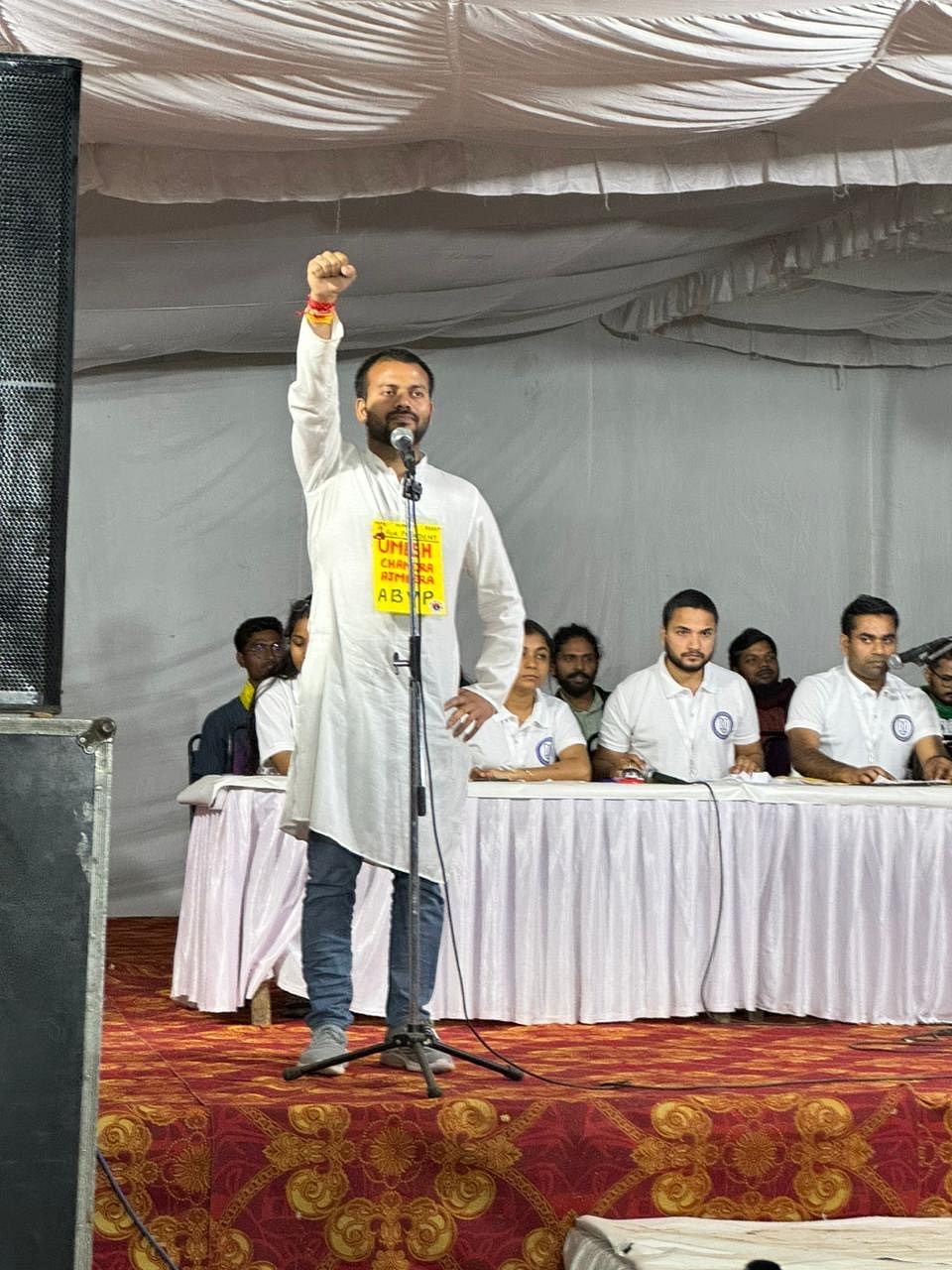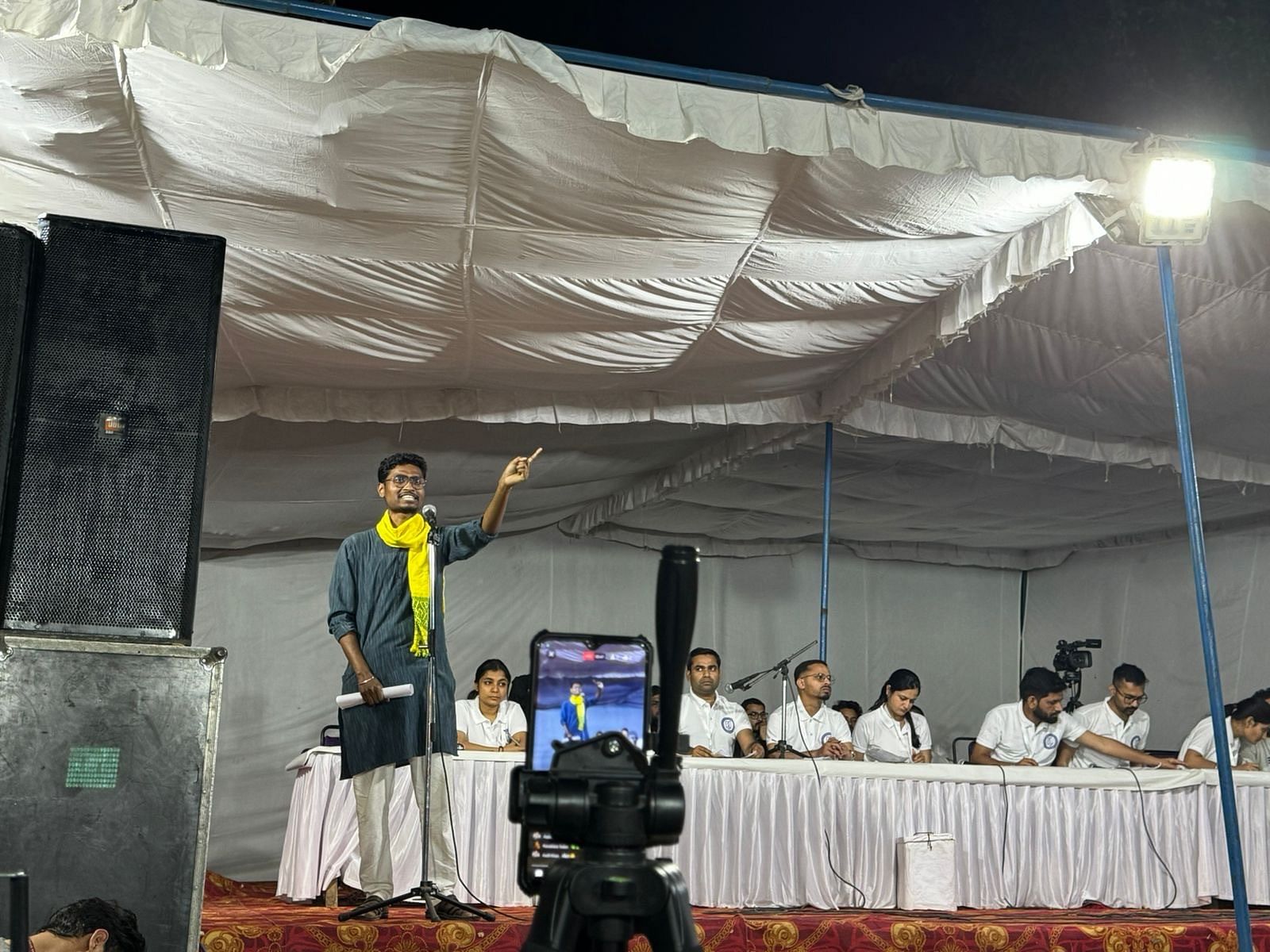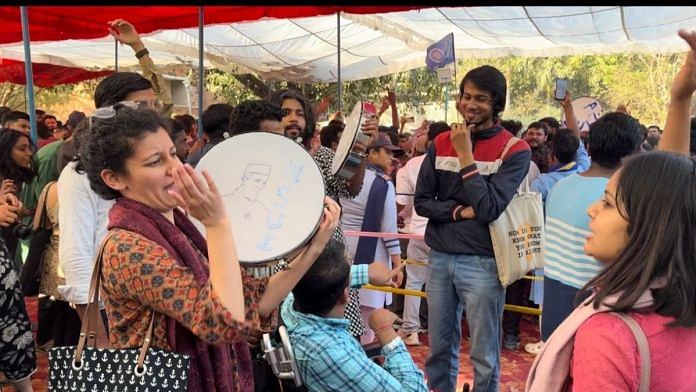It’s midnight. His right wrist wrapped in red threads — raksha sutra — Umesh Chandra Ajmeera, JNU presidential candidate of the RSS-affiliated Akhil Bharatiya Vidyarthi Parishad, raises his fist in the air before a sea of students. It’s almost as if he is emulating Ranbir Kapoor from Animal.
“I am an Adivasi whose father was killed by the Naxals,” he says.
His statement is met with cries of “This is a lie” and booing gestures of “thumbs down” by the opponents — students affiliated with the Left-wing student union.
“I am speaking from my heart today. The way they tried to suppress my father’s voice, today, they are trying to suppress my voice,” says Ajmeera as he greets students with ‘Jai Bhim’ and ‘Jai Shree Ram’, ahead of his presidential debate. His language encapsulating the politics of ABVP for the JNUSU polls.
Beyond the high-pitch campaigning and sloganeering, the biggest shift visible in one of the most bitterly fought campus polls in the country is the way ABVP is giving the United Left Alliance a piece of their own politics be it their campaign or candidates. The ABVP has for the first time fielded an Adivasi candidate as its presidential candidate, and its members aren’t shying away from borrowing their opponent’s language to woo student voters.
“…they (ABVP) are trying to present a more moderate image and working on grassroots by making student to student contact,” says PhD scholar Atul, who has been a part of JNU since 2016.

Also read: Bengaluru museum is making science artsy, buzzy. And it won’t stop changing
The shift
The sprawling Jhelum Lawn is reverberating with sloganeering, intermittent striking of dhols and daflis, and impassioned debates.
With ABVP launching a tribal candidate for the first time, and the Left unions coming together under the banner of United Left Alliance, the battle has become intense. The four-year gap that came with the suspension of elections due to Covid in 2019 has shifted the political dynamics within JNU, from ‘what’s happening in the world’ to ‘what’s happening on the campus.’
“In this campus, unless the roof doesn’t fall on the students, the administration doesn’t renovate. They don’t create a physical campus for PWD (persons with disabilities). Those sanitation workers who clean your washrooms everyday don’t receive their salary for three months. I am standing here for them,” says Dhananjay, a Dalit PhD scholar from Bihar’s Gaya district – the presidential candidate of the United Left Alliance.
Dhananjay claims to be the second Dalit Left presidential candidate and calls ABVP’s partially changed “vocabulary” and “fielding of a tribal presidential candidate” as “superficial posturing” after sniffing defeat.
“ABVP tried maligning the University by calling us anti-national but still they couldn’t attract the student voters. Now, they have adopted a new strategy. They are copying our mannerisms and words but JNU students are no fools. They are aware of ABVP’s ideology,” said Dhananjay, surrounded by a stream of students holding red flags.
The Left alliance — an amalgamation of Left students unions AISA, SFI, DSF — which have traditionally dominated the campus politics since the JNU’s inception in 1969, accuse PM Narendra Modi’s government for stifling intellectual discourse.
“Today, we have ABVP state president Tapan Kumar Bihari as JNU professor. They are taking the ideology to the classrooms. They (ABVP) are openly engaging in violence and supporting discriminatory movies such as Bastar that calls for shooting JNU students,” says the United Left Alliance’s presidential candidate.
On the backside of the Jhelum lawn, surrounded by a group of friends, Farheen Zaidi is struggling with a sore throat and is popping Strepsils.

“My voice is choked. I have a speech to deliver in a few minutes,” laments Zaidi, who is the National Students Union of India (NSUI) candidate for the post of General Secretary.
JNU elections have historically been a battleground of ideologies between Right-wing and Left-wing political organisations with student wing organisations such as NSUI holding a minimal presence. Yet, the student wing organisation of the national party Congress has strategically chosen its candidate in alignment with its national politics – focusing on minority representation.
“We were sure that we had to field a Muslim as a presidential candidate. The campus boasts of being secular and progressive. ABVP never fields a Muslim candidate and Left always offers joint secretary post to a Muslim as an act of tokenism. Can’t a Muslim lead?” asks Sudhanshu Shehkar, president NSUI, as he sat on the bench inside the Ganga hostel lawn.
“We wanted to counter this narrative. Be it a Hindu or Muslim, leadership depends on ability and not religion,” Shekhar adds.
In the backdrop, Zaidi finds his voice, saying “They (ABVP) are afraid because a Muslim woman is fighting the JNUSU elections.”
Also read: Bengaluru has a difficult choice—save a 230-year-old stud farm or stay congested
Campus politics, campus issues
In room number 315, at Jhelum Boys hostel, a small portrait of Lord Ram and Hanuman hangs side by side. Two Masters students and ABVP supporters are busy uploading pictures of their General Secretary candidate Arjun Anand on Instagram.
A native of Jammu, Anand is pursuing a PHD in Special Centre for the study of North East India. Wearing a Himachali cap, he grabs his jhola and talks about the anti-incumbency on campus politics.
“Campus politics should be on campus issues. We are here to fight for the student issues and break the anti-incumbency of the Left union from the last 50 years,” says Anand even as the young boys and girls sitting in his room cheer loudly.
Another student in the room is distributing prasad, from his recent temple visit, to the volunteers who have been busy working for the election campaign foregoing meals since morning. Discussions are ongoing on how the Left student union has made JNU a launchpad for national politics.
“When students were suffering during Covid, former JNUSU president Aishe Ghosh was in West Bengal lobbying for her ticket. And when she failed to get the ticket, she came back and started asserting her presidential credentials,” claims Anand, yawning, as he makes his point after a tiring general secretary debate at the Jhelum Lawn.
Barrack hostel, building of Academic Block 2, hostel renovation and laboratory fund — today, the ABVP and United Left Alliance are fighting on similar issues. But this was not the case in the past elections, says Atul, who has been a part of JNU since 2016. ABVP has changed its electoral strategy, he says.
“Ideology of ABVP is the same, what has changed is their understanding of the student politics within JNU. They have understood that talking nationalism won’t sway the voters,” says Atul.
Also read: A new language war in Karnataka is brewing. This time over Tulu dignity
The BAPSAs
Wearing a green shawl around his neck, Birsa Ambedkar Phule Students’ Association (BAPSA)’s Biswajit Manjhi asserts he is the first Adivasi presidential candidate. In JNU, the fight to establish ‘who is the real Adivasi’ seems perpetual.
Holding the mic close to his mouth, and his left arm resting on his hip, Manjhi launches his attack on the United Left Alliance and ABVP, “Manuwadi rightist and Leftist say election is a festival.”
“For us, Bhaujans it is not a festival but a fight for representation,” he raises his hand as the BAPSA student supporters whistle.
Manjhi doesn’t stop at that. He challenges the ABVP and United Left Alliance to show their allegiance for Bhajuans by burning Manusmriti.
“The Right and the Left are oppressing Dalits. This is No Ambani or Adani University. BAPSA will solve discrimination and make campus inclusive for all oppressed sections.”
As Manjhi ends his presidential speech, the JNU election commission interrupts to make an important statement — “The presidential debate is being recorded.”
Delhi High Court appointed former Supreme Court Judge Justice V. Ramasubramanian on 16 March as observer to oversee the “activities of Election commission.”
While the students went silent during the announcement, it didn’t take away the momentum, as the drums struck back within a minute with slogans.
Also read: Quota for women, minorities & civil code — where India’s ‘founding mothers’ stood on key issues
Shattered romanticism
Sitting near the Ganga Hostel, Prince Yadav left IIT to study at JNU. A native of Prayagraj, Yadav heard about the University for the first time in 2016 when JNU hogged the limelight surrounding the ‘Afzal Gurus protests’. He says he was inspired by the struggle of JNUSU president Kanhaiya Kumar. But now, he is disappointed.
“People are fighting for a post not for us. Kanhaiya did that too. JNU is not the same anymore.”
Nikhil (name changed) from the School of Languages says the intellectual discourse has lost its momentum on the campus.
“There are no more debates and discussions. In the last four years, the Left was not allowed to protest and the Right was busy providing hostels to those who will join them. The intellectual debate has been replaced by Right wing discourse. Students are now going to them,” says Nikhil, surrounded by his friends who nod in agreement.
In the background, Deepika Sharma, native of Haryana and the vice-presidential candidate from ABVP shouts, “Ram Ram Sariyane. Mei aapka istakabal karti hu…They are worried about Palestine and Talibans not for JNU students.”
Swati Singh, United Left Alliance candidate for general secretary, laughs loudly and says, “Now, ABVP is also using the word istakabal.”
“Left has ensured that JNU doesn’t turn into a hub of money and muscle politics and that is why today, we are seeing that even the Right has to raise student centric issues,” says Mishra.
Meanwhile, another presidential candidate Aradhana Yadav shouts, “Jai Lalu Yadav… They are followers of those Manu who said that women should be kept inside the houses.” The crowd cheers and the drums play.
Back in room number 315, Anand is preparing a “winning” speech. Anand claims that during Congress governments, Left student unions were always favored, but that is not the case this time around.
“ABVP was never this sure about its win earlier but now, with a nationalistic party in power, we feel more confident.”
(Edited by Anurag Chaubey)



